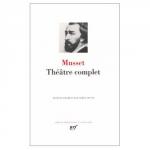|
This section contains 5,734 words (approx. 20 pages at 300 words per page) |

|
SOURCE: Beus, Yifen. “Alfred de Musset's Romantic Irony.” Nineteenth-Century French Studies 31, nos. 3-4 (spring-summer 2003): 197-209.
In the following essay, Beus considers the ironic mood of Musset's collected drama and poetry, characterizing the writer as an outstanding proponent of nineteenth-century French Romantic irony.
The year of 1797, though somewhat arbitrary in terms of historical significance in German and French drama, marks German philosopher and theorist Friedrich Schlegel's initial efforts to establish irony as a philosophical as well as literary concept. The concept of irony was then being rediscovered and redefined by the early Romantics and is now considered by scholars of Romanticism essential to the understanding of the Romantic doctrines. As Friedrich and his brother August Wilhelm Schlegel drew inspiration from the early (Shakespeare and Cervantes) as well as the contemporary moderns (Sterne, Diderot, and Goethe) in analyzing and theorizing modern art and literature, the French also noticed the dominance...
|
This section contains 5,734 words (approx. 20 pages at 300 words per page) |

|


